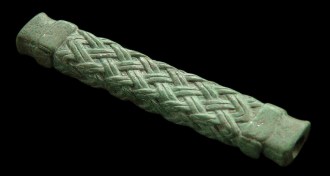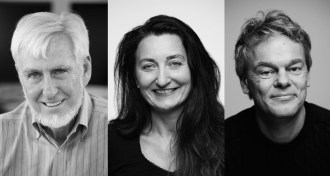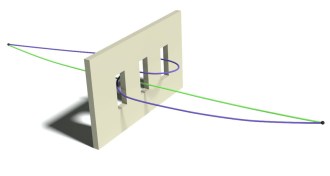Uncategorized
-
 Chemistry
ChemistryLasers wrest oxygen from carbon dioxide
By zapping oxygen molecules off carbon dioxide, an experiment hints that Earth may have had breathable air long before the dawn of plants.
By Beth Mole -
 Anthropology
AnthropologyMysterious foreigner may have ruled ancient Maya kingdom
Bone chemistry suggests one of the early rulers of the Maya kingdom Copan and his retainers had foreign credentials.
By Bruce Bower -
 Neuroscience
NeuroscienceNeuroscientists garner Nobel for discovering brain’s ‘inner GPS’
Three researchers who found brain cells that allow rats to orient themselves in space have won the 2014 Nobel Prize in physiology or medicine.
-
 Animals
Animals‘Planet of the Bugs’ reveals the secrets to insects’ success
Entomologist Scott Richard Shaw explores the evolution of insects and how they came to rule the world.
By Sid Perkins -
 Quantum Physics
Quantum PhysicsPhotons on roundabout route could get caught in action
Proposed twist on classic double-slit experiment could identify light that weaves in and out.
By Andrew Grant -
 Ecosystems
EcosystemsHelp scientists find floating forests of kelp
By looking for signs of kelp in satellite images, citizen scientists can help researchers keep track of the world’s seaweed forests.
-
 Health & Medicine
Health & MedicineInteractive map tracks obesity in the United States
An interactive online map illustrates the rise in U.S. obesity since 1990.
By Nathan Seppa -
 Environment
EnvironmentHuman ingenuity takes on Mother Nature in ‘The Big Ratchet’
Geographer Ruth DeFries explains how technological innovations have allowed humans to overcome environmental challenges throughout history.
-

-
 Health & Medicine
Health & MedicineZero calories and other awe-inspiring science tales
In this issue, reporters look at artificial sweeteners, resurrecting a West Coast plant, quasiparticles and the future of our magazine and its parent non-profit, SSP.
By Eva Emerson -
 Science & Society
Science & SocietySSP’s new leader has a habit of making things happen
Maya Ajmera takes the helm as the president and CEO of the Society for Science & the Public and publisher of Science News.
By Science News -
 Quantum Physics
Quantum PhysicsQuasiparticles help physicists make sense of the world
To improve semiconductors, superconductors and other materials, physicists view a particle and its surroundings as one entity.
By Andrew Grant